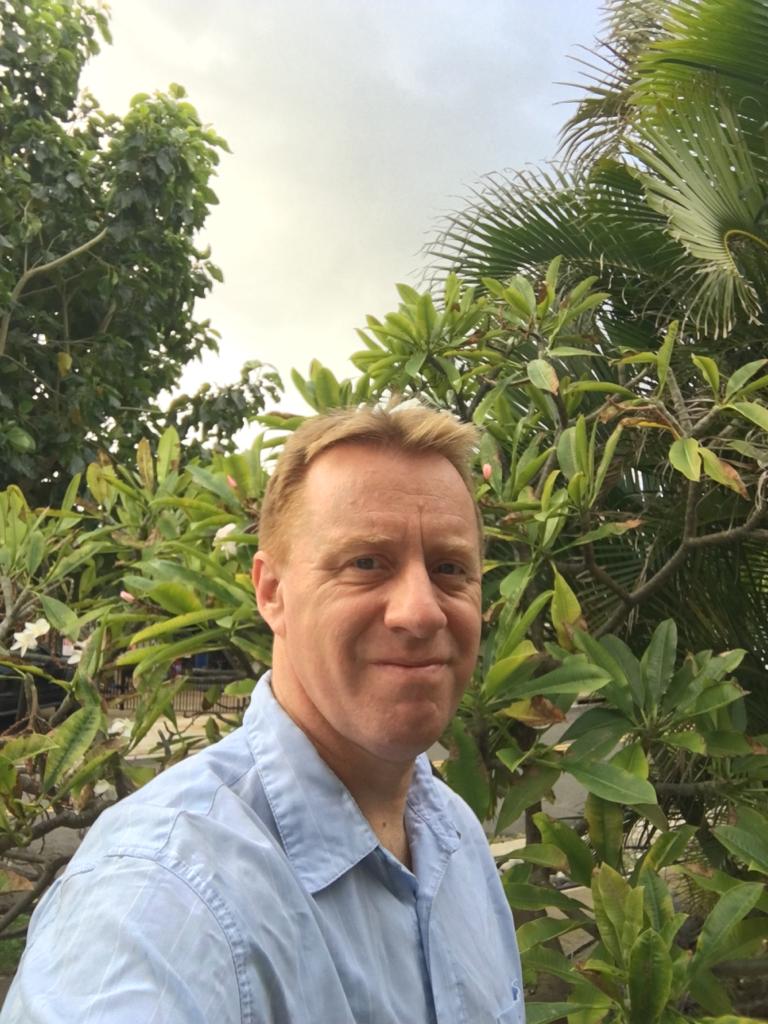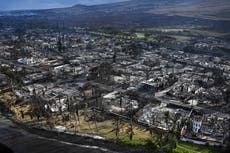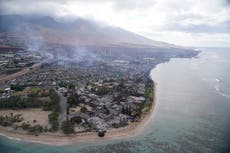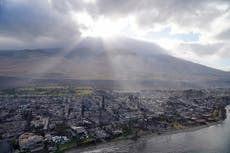Your support helps us to tell the story
From reproductive rights to climate change to Big Tech, The Independent is on the ground when the story is developing. Whether it's investigating the financials of Elon Musk's pro-Trump PAC or producing our latest documentary, 'The A Word', which shines a light on the American women fighting for reproductive rights, we know how important it is to parse out the facts from the messaging.
At such a critical moment in US history, we need reporters on the ground. Your donation allows us to keep sending journalists to speak to both sides of the story.
The Independent is trusted by Americans across the entire political spectrum. And unlike many other quality news outlets, we choose not to lock Americans out of our reporting and analysis with paywalls. We believe quality journalism should be available to everyone, paid for by those who can afford it.
Your support makes all the difference.It’s raining on the North Shore of Maui this morning where I live. But the rain is too late, and in the wrong place, to help the Maui Fire Department save the historic town of Lahaina.
I’m an English expat, naturalised both to the US and to the islands of Hawaii after 17 years. Maui is my home. As a resident of Maui, married into a family born and raised on the island, the loss of Lahaina’s Old Town is devastating.
First and foremost is the loss of life. Maui is a small island; everyone knows everyone, or at least knows someone who knows everyone.
We are yet to find out who has been lost, but that will filter through in the next few days on the “coconut wireless” (the Hawaii version of the grapevine). These losses will be felt locally for at least a generation, and we are praying that no one we know personally is involved.
The local population, especially in Lahaina, is largely employed by the tourist industry, which on Maui’s Westside is centred in the hotels in Kaanapali and in Lahaina.
Beyond the devastating loss of life, Maui’s economy has taken an untold hit for the foreseeable future: workers are left with nowhere to work, and there is a consequent loss of tourists to fuel the industry.
We have also lost so much history. Lahaina was the whaling centre of the Pacific in the nineteenth century. Herman Melville himself was a regular visitor in his whaling days, inspiring his great work Moby Dick.
The original Baldwin Mission House, constructed in the 1830s, has gone; it was the oldest Western-style structure on the island. We also lost the old courthouse and its contents of historical memorabilia, including Native Hawaiian artefacts.
The Courthouse Museum fronts the famous 150-year-old banyan tree that defines the spirit of Front Street in Lahaina, offering shade, shelter, and a communal space for gathering. We wait to discover if the roots survived the fire, because if they did then the tree will return.

Like all islanders, I have personal history in Lahaina. My son’s first preschool, a Montessori school adjacent to the Japanese Hongwanji, was destroyed.
I have spent hours and days visiting family and friends walking through the sites and street sellers, dining at restaurants like Down the Hatch and Cool Cat Café; all gone.
Friends of my wife, Sarah, have lost their homes. Sarah, like many Mauians, spent her early adulthood living in Lahaina while she worked in the hotel industry in Kaanapali; the homes she lived in during that time are now all gone.
Moreover, Native Hawaiians have lost some of their pre-contact history. Lahaina had been the capital of the early Hawaiian Kingdom due to its harbour and its natural resources, especially its fish and water from the Western Maui Mountains.
In recent years a great effort has been made by Hawaiian activists to restore some of ancient Hawaii’s infrastructure in Lahaina, including a royal fishing pond that had been tarmacked over to create a parking lot.
Some Native Hawaiians are pointing out, with justification, that construction is in large part to blame for a fire that never would have happened had the land been properly cared for.
A major factor is that construction has required the appropriation and altering of natural waterways away from their geographical routes; in the days before contact, Lahaina was lush, green, and tended.
If we had been hit directly by hurricane Dora, then at least we could have prepared. We would have sustained damage but not total loss, and maybe we would not have lost any lives. As it is, we lost hundreds of years of history, art, and culture in 24 hours.

For us, the loss of Lahaina Town is the equivalent of Parisiens losing Notre Dame in 2019, or Londoners losing St Paul’s to the Great Fire in 1666. More harrowing though are the lives lost, and the lives of families and loved ones affected.
Finally, though, Lahaina’s Old Town was just a wonderful place, full of vivid colour, life, industry, and fun.
It truly was a little paradise. It was a place for locals on the north and east of the island to escape to on days off.
I would take my children there to walk and shop and play; it was a little holiday from the usual where you could “play tourist” and get world-class ice cream... We will rebuild, and we will gratefully accept help.
Professor Richard Hill has lived in Hawaii for 17 years and teaches English literature at Chaminade University of Honolulu and University of Hawaii Maui College





Join our commenting forum
Join thought-provoking conversations, follow other Independent readers and see their replies
Comments